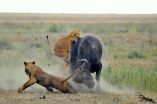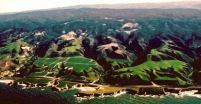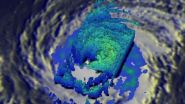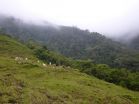(Press-News.org) Why aren't there more lions? That was what puzzled McGill PhD student Ian Hatton, when he started looking at the proportion of predators to prey across dozens of parks in East and Southern Africa. In this case, the answer had nothing to do with isolated human hunters. The parks were teeming with potentially tasty treats for the lions. So one might imagine that the population of lions in each park would increase to match the available prey. Instead, what Hatton and the McGill-led team discovered was that, in a very systematic way, in crowded settings, prey reproduced less than they did in settings where their numbers were smaller. Moreover, they found this same pattern in a whole range of different ecosystems.
It's a surprising finding that suggests a level of organizational structure and function in ecosystems that had not previously been recognized. Although biologists have long known of very regular mathematical laws governing functions in the body like metabolism and growth, no study has ever shown that similar kinds of laws may exist at a whole other level: that of ecosystems globally. Some scientists are already suggesting that it may well be the discovery of a new law of nature.
It came about by chance.
High school holidays
"I went to high school in Zimbabwe and spent vacations in the National parks there," says Hatton, the lead author of the study that was just published in Science. "When I began my PhD in biology at McGill, I wanted to go back and compare whole communities of African animals across protected ecosystems to see how the numbers of carnivores are related to their herbivore prey at the scale of whole landscapes. So I gathered all the animal census data I could for parks in east and southern Africa."
When Hatton and his colleagues then started putting it all together and crunching the numbers, summing up all the carnivores (lion, hyena, leopard, etc.) and herbivores (buffalo, zebra, impala, etc.) in these parks, they found a very unexpected and regular pattern. In every park they looked at, there seemed to be a very consistent relationship of predator to prey. But not in the simple pattern they might have expected to find.
Some surprising calculations
"Until now, the assumption has been that when there is a lot more prey, you'd expect correspondingly more predators," says Hatton. "But as we looked at the numbers, we discovered instead, that in the lushest ecosystems, no matter where they are in the world, the ratio of predators to their prey is greatly reduced. This is because with greater crowding, prey species have fewer offspring for every individual. In effect, the prey's rates of reproduction are limited, which limits the abundance of predators."
Once they observed this pattern in one setting, the researchers then began analyzing data about food pyramids, and the relationship between predators and prey in ecosystems as varied as the Indian Ocean, the Canadian Arctic and the tropical rainforests. Over the course of the next few years they analyzed data gathered about both plants and animals from more than 1000 studies done over the past 50 years covering a range of grassland, lake, forest and ocean ecosystems around the world.
In all these different settings, they found a surprising consistency in the relation of predators to prey, and confirmation that rather than the numbers of predators increasing to match the available prey, predator populations are limited by the rate at which prey reproduce.
"We kept being astonished," said Kevin McCann, of Guelph University's Department of Integrated Biology, one of the study's co-authors. "This is just an amazing pattern."
A new law of nature?
What the researchers also found intriguing was that the growth patterns they saw across whole ecosystems, where large numbers of prey seemed naturally to reproduce less, were very similar to the patterns of growth in individuals. "Physiologists have long known that the speed of growth declines with size," said co-author Jonathan Davies from McGill's Dept. of Biology. "The cells in an elephant grow more than 100 times more slowly than those of a mouse."
"The discovery of ecosystem-level scaling laws is particularly exciting," adds co-author Michel Loreau, adjunct professor in McGill's Biology Dept. and currently at the Centre national de recherché scientifique (CNRS) in France. "Their most intriguing aspect is that they recur across levels of organization, from individuals to ecosystems, and yet ecosystem-level scaling laws cannot be explained by their individual-level counterparts. It seems that some basic processes reemerge across levels of organization, but we do not yet fully understand which ones and why."
INFORMATION:
Scientists who are familiar with the study and can comment on it:
Just Cebrian jcebrian@disl.org, University of South Alabama, Dauphin Island Sea Lab
Van Savage vsavage23@gmail.com, UCLA, Department of Biomathematics
McGill Media Relations contact:
Katherine Gombay, Katherine.gombay@mcgill.ca
514-398-2189
CAMBRIDGE, Mass. (September 3, 2015) - A protein known to play a role in transporting the molecular contents of normal cells into and out of various intracellular compartments can also turn such cells cancerous by stimulating a key growth-control pathway.
By conducting a large-scale search for regulators of the signaling pathway known as PI3K/AKT, which promotes cell survival, growth, and proliferation--and which is highly active in cancer cells--researchers at Whitehead Institute and Memorial Sloan-Kettering Cancer Center have implicated the protein RAB35 in the oncogenic ...
For millions of years, the Pacific and North American plates have been sliding past -- and crashing into -- one another. This ongoing conflict creates uplift, the geological phenomenon that formed mountains along the west coast.
A new analysis by UC Santa Barbara earth scientist Alex Simms demonstrates that the Pacific coastlines of North America are not uplifting as rapidly as previously thought. The results appear in the journal Geological Society of America Bulletin.
"Current models overestimate uplift rates by an average of 40 percent," said Simms, an associate ...
Hurricane Jimena, a once powerful Category 4 storm with maximum sustained winds estimated at 140 mph by the National Hurricane Center, has continued to weaken well east of Hawaii. The Global Precipitation Measurement or GPM core satellite analyzed rainfall rates and saw the eyewall was eroding.
The eyewall of a hurricane contains a storm's most damaging winds and intense rainfall. It consists of a vertical wall of powerful thunderstorms circling a hurricane's open eye.
GPM is a joint mission between NASA and the Japanese space agency JAXA. GPM captured data on Jimena ...
The world is facing an extinction crisis as more and more forests are converted into farmland. But does it help when farms share the land with birds and other animals?
The short answer is "no," according to new evidence based on the diversity of bird species reported in the Cell Press journal Current Biology on September 3. If the goal is to preserve more bird species, representing a greater span of evolutionary history, then it's better to farm more intensively in some areas while leaving more blocks of land entirely alone. In other words, land-sparing wins out over ...
High levels of saturated fat in the blood could make an individual more prone to inflammation and tissue damage, a new study suggests.
Received wisdom on the health risks of eating saturated fat has been called into question recently. This new research supports the view that excessive consumption of saturated fat can be bad for us.
Scientists from Imperial College London studied mice that have an unusually high level of saturated fat circulating in their blood. The research, published today (3 September 2015) in Cell Reports shows that the presence of saturated fats ...
Giving cancer patients aspirin at the same time as immunotherapy could dramatically boost the effectiveness of the treatment, according to new research published in the journal Cell today (Thursday).
Francis Crick Institute researchers, funded by Cancer Research UK, have shown that skin, breast and bowel cancer cells often produce large amounts of prostaglandin E2 (PGE2). This molecule dampens down the immune system's normal response to attack faulty cells, which helps cancer to hide. It is a trick that allows the tumour to thrive and may explain why some immunotherapy ...
LAWRENCE - Men might want to ditch the pickup lines and polish their punchlines in their quest to attract women, new research at the University of Kansas suggests.
Jeffrey Hall, associate professor of communication studies, found that when two strangers meet, the more times a man tries to be funny and the more a woman laughs at those attempts, the more likely it is for the woman to be interested in dating. However, an even better indicator of romantic connection is if the two are spotted laughing together.
Those findings were among the discoveries Hall made in his search ...
Coral Gables, Fla. (September 1, 2015) - Cognitive flexibility is the ability to shift our thoughts and adapt our behavior to the changing environment. In other words, it's one's ability to disengage from a previous task and respond effectively to a new one. It's a faculty that most of us take for granted, yet an essential skill to navigate life.
In a new paper published in the journal Trends in Neurosciences, University of Miami (UM) College of Arts & Sciences researchers clarify many of the concepts surrounding cognitive flexibility and propose a model of its underlying ...
Researchers involved in an international collaboration across six institutions, including the University of Copenhagen and the National Aquarium of Denmark (Den Blå Planet), have successfully identified the exact composition of sea snake venom, which makes the future development of synthetic antivenoms more realistic. Currently, sea snake anitvenom costs nearly USD 2000, yet these new findings could result in a future production of synthetic antivenoms for as little as USD 10-100.
Venomous snakebites represent a major health concern in many tropical and subtropical ...
Sea level rise poses one of the biggest threats to human systems in a globally warming world, potentially causing trillions of dollars' worth of damages to flooded cities around the world. As surface temperatures rise, ice sheets are melting at record rates and sea levels are rising.
But there may be some good news amid the worry. Sea levels may not rise as high as assumed.
To predict sea level changes, scientists look to Earth's distant past, when climate conditions were similar to today, and investigate how the planet's ice sheets responded then to warmer temperatures ...





